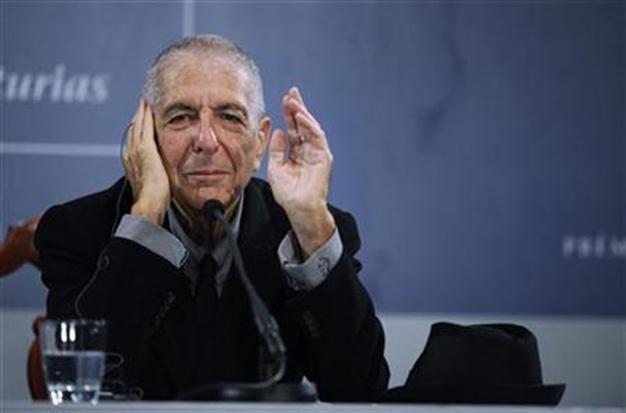Leonard Cohen sings the blues
PARIS - Agence France-Presse

Leonard Cohen. REUTERS Photo
For four decades Leonard Cohen's brooding lyrics won him fans and accolades the world over, but the folk-rock poet never felt legitimate singing the blues -- until now.Elegantly clad in a suit and black trilby, the 77-year-old Canadian was in Paris this month to promote his new album "Old Ideas", the first in eight years -- 10 pared-down songs with a strong blues flavour.
"I've always loved the blues, I've always loved the musical construction of the blues, but I've always felt that I didn't have the right to sing the blues," he explained, in his distinctive baritone.
"But somehow, the right was granted to me, I don't know by what authorities, but I felt that I had the right to use that form and a number of songs came to me that way.
"Now I have the permission to sing the blues," he said.
Born in the tiny English-speaking quarter of Montreal, Cohen published books of poetry before embarking on a singing career with his debut album "Songs of Leonard Cohen", featuring such tracks as "Suzanne" and "So Long, Marianne."
Since then the singer has inspired countless artists, who have produced more than 1,000 cover versions of his work including "Hallelujah", a cult favourite covered by the late singer Jeff Buckley.
Released on January 30, the sound of "Old Ideas" marks a departure from Cohen's last work, the 2004 "Dear Heather", but it returns to the often weighty themes he holds dear, of spirituality, love, sexuality, the past and death.
"I think like tofu the song takes on the flavour of the emotional gravy of what you sense," he said. "If one needs one's own suffering to be addressed, I think you can find that component in a song," he added.
But there is a vein of humour and self-deprecation on the album as well, like on the opening track "Going Home", in which Cohen addresses "Leonard", "a sportsman and a shepherd", "a lazy bastard, living in a suit."
Cohen suffered in the past from long-term depression, but says he has now escaped from under its shadow.
"I am happy to report that at a certain point in my life that depression slowly dissolved and it has not returned with the same kind of ferocity that prevailed during most of my life."
"So hopefully that's gone, and it won't return," he said.
On the whole, Cohen said he was "quite in a good mood" when he wrote the 10 songs on the album, some as early as 2007.
Asked about his reputation as a charmer, he said wryly: "For me to be a ladies' man at this point involves a great deal of humour."
And to another journalist's question probing his interest in death: "I've come to the conclusion, reluctantly, that I am going to die, so the possibility produces some thoughts.
"I'd like to come back as my daughter's dog," he quipped.
Cohen quit the music scene in the early 1990s to join a Buddhist monastery in California, where he was ordained a Rinzai Zen Buddhist monk and took the name Jikhan, meaning "silence".
But the singer-songwriter, whose music has featured in dozens of movie soundtracks from "Natural Born Killers" to "Shrek", was forced to make a comeback after being swindled out of his retirement nest egg by his former manager.
He went on a world tour from 2008 to 2010, with a series of performances that received rave reviews from the public and critics, although some shows had to be postponed due to a back injury.
Nevertheless, Cohen says a return to the stage in 2012 is "certainly in my head".
And a sequel to "Old Ideas" could also surface fairly quickly.
"I have enough for a new record which I'm working on now. So, God willing, I'll be able to finish another record within a year or so," he said. "I have lot of unfinished material," he said.
















